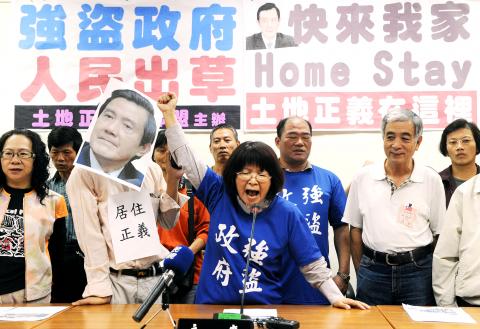Land owners and activists yesterday staged a protest at the legislature in Taipei, accusing the government of reneging on its promise and abruptly passing proposed revisions to the Land Expropriation Act (土地徵收條例) to second reading without prior discussion.
They also expressed their concern that the Cabinet-proposed revisions might eventually be adopted, as the Chinese Nationalist Party (KMT) enjoys an absolute majority in the legislature.
Following a slew of protests over government seizure of private land for development projects around the country, President Ma Ying-jeou (馬英九) and Premier Wu Den-yih (吳敦義) made several promises to amend the Land Expropriation Act, including requiring land developers to clearly state that they are necessary and how the project would uphold public interests.

Photo: CNA
However, the amendments proposed by the Cabinet did not include such clauses and only aim to change the basis for calculation of compensation for landowners from published prices to market prices.
Landowners and other advocacy groups said the proposed revisions should also include the participation of a third-party expert when estimating the land value.
In a bid to ensure that the amendments are passed before the legislative election in January, the Legislative Yuan — under the KMT’s lead — decided to skip initial discussions in the first reading and pushed the proposal straight into second reading.
“The KMT put the amendments directly into second reading to avoid discussions in the Internal Administration Committee,” Democratic Progressive Party (DPP) Legislator Tien Chiu-chin (田秋堇) told a news conference at the Legislative Yuan. “With its absolute majority, the KMT could pass the amendments despite opposition, and the expectations of landowners, farming activists and other rights advocacy groups would be sacrificed.”
“While Ma is having his ‘homestay’ tour around the country for his re-election campaign, I invite the president to stay at my house and the homes of all land expropriation victims,” Metro A7 Station Development Project Self-Help Group chairwoman Hsu Yu-hung (徐玉紅) said. “He should stay with us, eat with us, work with us, be treated by us and hear what we have to say.”
The expropriation project is part of the “A7 station of the Taoyuan International Airport MRT development project,” which aims to build affordable housing units and an industrial zone near the temporarily named “A7 station” on the planned Taoyuan International Airport MRT line connecting central Taipei and Taoyuan County.
A tearful Peng Hsiu-chun (彭秀春), a resident of Dapu Borough (大埔), Jhunan Township (竹南), said she was saddened when she received an official notice from the Miaoli County Government informing her that her home was to be taken over for a science park project.
“The house that I live in is the product of a lifetime of hard work by me and my family,” she said. “The legislature should revise the Land Expropriation Act according to the people’s voices, so that no one in this country would live in constant fear of having their property taken away by the government.”
Wang Wan-ying (王婉盈), a resident of Houli District (后里) in Greater Taichung, whose house was torn down to make way for Phase 3 of the Central Taiwan Science Park, said that if the government was sincere about increasing the nation’s self-sufficiency in food, “it should stop taking over farmlands for development projects.”

Chinese Nationalist Party (KMT) Chairman Eric Chu (朱立倫), spokeswoman Yang Chih-yu (楊智伃) and Legislator Hsieh Lung-chieh (謝龍介) would be summoned by police for questioning for leading an illegal assembly on Thursday evening last week, Minister of the Interior Liu Shyh-fang (劉世芳) said today. The three KMT officials led an assembly outside the Taipei City Prosecutors’ Office, a restricted area where public assembly is not allowed, protesting the questioning of several KMT staff and searches of KMT headquarters and offices in a recall petition forgery case. Chu, Yang and Hsieh are all suspected of contravening the Assembly and Parade Act (集會遊行法) by holding

PRAISE: Japanese visitor Takashi Kubota said the Taiwanese temple architecture images showcased in the AI Art Gallery were the most impressive displays he saw Taiwan does not have an official pavilion at the World Expo in Osaka, Japan, because of its diplomatic predicament, but the government-backed Tech World pavilion is drawing interest with its unique recreations of works by Taiwanese artists. The pavilion features an artificial intelligence (AI)-based art gallery showcasing works of famous Taiwanese artists from the Japanese colonial period using innovative technologies. Among its main simulated displays are Eastern gouache paintings by Chen Chin (陳進), Lin Yu-shan (林玉山) and Kuo Hsueh-hu (郭雪湖), who were the three young Taiwanese painters selected for the East Asian Painting exhibition in 1927. Gouache is a water-based

Taiwan would welcome the return of Honduras as a diplomatic ally if its next president decides to make such a move, Minister of Foreign Affairs Lin Chia-lung (林佳龍) said yesterday. “Of course, we would welcome Honduras if they want to restore diplomatic ties with Taiwan after their elections,” Lin said at a meeting of the legislature’s Foreign Affairs and National Defense Committee, when asked to comment on statements made by two of the three Honduran presidential candidates during the presidential campaign in the Central American country. Taiwan is paying close attention to the region as a whole in the wake of a

OFF-TARGET: More than 30,000 participants were expected to take part in the Games next month, but only 6,550 foreign and 19,400 Taiwanese athletes have registered Taipei city councilors yesterday blasted the organizers of next month’s World Masters Games over sudden timetable and venue changes, which they said have caused thousands of participants to back out of the international sporting event, among other organizational issues. They also cited visa delays and political interference by China as reasons many foreign athletes are requesting refunds for the event, to be held from May 17 to 30. Jointly organized by the Taipei and New Taipei City governments, the games have been rocked by numerous controversies since preparations began in 2020. Taipei City Councilor Lin Yen-feng (林延鳳) said yesterday that new measures by